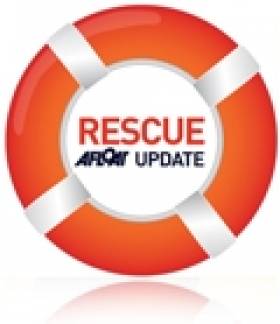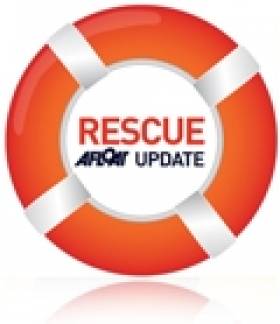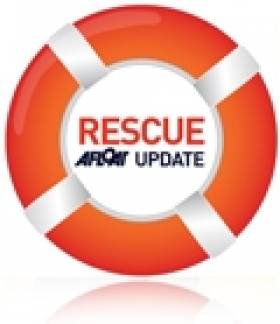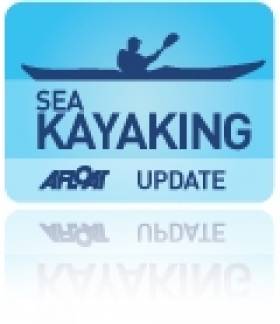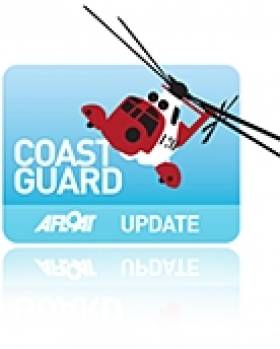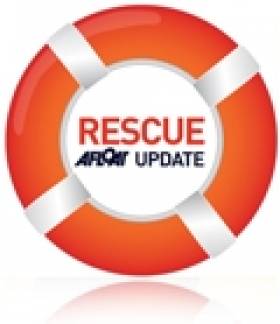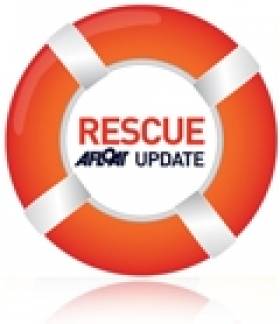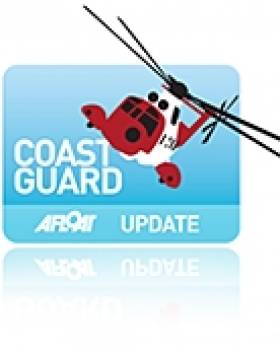Displaying items by tag: Rescue
Howth Walker Rescued From 'Five Storey High' Cliff Ledge
#Rescue - Howth's coastguard unit rescued a man on Howth Head who became trapped on a cliff ledge some five storeys above the beach below yesterday evening (Monday 7 September).
Unable to find a way off the beach, the man had climbed up the sea cliff near Ceanchor Road but soon found himself crag-fast, unable to move up or down.
Howth Coast Guard was tasked at 5pm and located the casualty on a small ledge 15 meters above the shoreline rocks.
A sea cliff rescue climber was lowered in from the top of the cliffs and, using a rescue strop, secured the casualty into a safe position clear of rockfall.
The response team used a rope rescue haul system to recover both climber and casualty to the cliff top. The casualty required no further medical assistance and was assisted by gardaí back to their transportation.
The Irish Coast Guard thanked the members of the public who alerted the emergency services using CASPER: Call 112; Ask for the correct service; Speak clearly and slowly; give a good Position; Explain the emergency; and Remain where you are.
If you spot somebody in difficulty on the coast, at cliffs or at sea, call 112 and ask for the coastguard.
Elderly Passer-By Saves Drowning Man's Life In Limerick
#Rescue - A life buoy thrown by an elderly passer-by helped save the life of a drowning man in the River Shannon at the weekend, as TheJournal.ie reports.
The incident occurred on Saturday afternoon (11 July) at the Shannon Bridge in Limerick city centre, where the elderly man spotted a man in his 40s enter the water near St Michael’s Rowing Club and threw him the life ring from the bridge walkway - keeping him afloat till emergency services arrived.
TheJournal.ie has more on the story HERE.
RNLI Lifeguards Assist Paddle Boarders On Whiterocks Beach
#Rescue - RNLI lifeguards assisted two stand-up paddle boarders on Whiterocks beach in Portrush on Saturday (11 July) during strong offshore winds.
Senior RNLI lifeguard Bosco McAuley spotted two people in difficulty at 3.40pm approximately 100 metres out to sea within the lifeguards flagged patrol zone on the beach.
The two women were both on stand-up paddle boards when they got caught off guard by a strong offshore wind. Weather conditions were described as overcast and windy at the time, with about 1-2 foot of surf.
After observing the situation, McAuley asked his RNLI lifeguard colleagues Bruce Traill and Ali Boyd to assist. Traill quickly put on his RNLI rescue watercraft kit while Boyd launched the jetski into the water.
McAuley then proceeded to the two paddle boarders and assisted them safely back to shore before going back to retrieve the two paddle boards.
"Offshore winds during the summer season can cause issues on the beaches, when these situations arise we are on scene and can quickly deal with them to ensure the public’s safety," said McAuley after the rescue.
RNLI supervisor Tim Doran added: "Anyone who gets into difficulty the water should try to remain calm, raise their arm and signal for help. Our lifeguards are well trained when it comes to spotting people in danger in the water and are quick to respond."
" With numbers on the beaches expected to increase for the July holidays this week, Doran reminded people to be mindful of the RNLI’s key safety advice – particularly for those planning to use the water.
"If you are planning on visiting a beach this summer, choose a lifeguarded beach and swim between the red and yellow flags, which mark the safest area to swim and are an indicator that lifeguards are on duty.
"If you see someone else in trouble in the water, call on the help of a lifeguard or dial 999 and ask for the coastguard."
RNLI Lifeguards Rescue Man On Castlerock Beach
#RNLI - RNLI lifeguards rescued a man who found himself in difficulty on Castlerock Beach in Co Derry yesterday afternoon (Friday 3 July).
Shortly before 12.30pm, senior lifeguard Damian McCauley was assisting two vehicles that had got stuck in soft sand at the entrance to the beach when he heard a man call from one of the cars and wave for help.
The man, who was on his own in the car, was hunched over, struggling to breathe with his arms shaking, while his voice was hoarse and weak.
McCauley immediately ran for the lifeguard’s first aid responder bag and, using his training, began to deliver casualty care.
Meanwhile, lifeguard Beth Montgomery, who was acting as the communications liaison, alerted the coastguard and the Northern Ireland Ambulance Service.
Lifeguard Conor O’Callaghan ensured the beach, which had about 300 people visiting at the time and with 40 people in the water, remained open by patrolling between the red and yellow flags.
On monitoring the casualty’s breathing, McCauley observed that oxygen was required and, using the RNLI apparatus, proceeded to ensure the man got this. He continued to carry out casualty care while talking to the man for 25 minutes until the other emergency services arrived.
By that time the man had begun to respond to the oxygen and was then transferred from his car to an ambulance and brought to the Causeway Hospital in Coleraine.
Speaking following the rescue, RNLI lifeguard supervisor Tim Doran said: "We would like to wish this gentleman well and hope he makes a speedy recovery following his ordeal this afternoon.
"He managed to raise the alarm quickly when he found himself in difficulty today and thankfully our lifeguards were able to respond immediately and give him the medical attention he needed right away.
"This rescue is testament to the first aid training our lifeguards have and to the equipment we carry on the beaches which ensure we can deliver good casualty care."
Doran added: "Our lifeguards worked well together today to deal with the emergency, liaise with the other emergency services and keep patrol of the remainder of the beach.
"This incident is another example of how our lifeguards' vigilance is as important on the beach dealing with land-based incidents as it is when patrolling incidents that unfold in the water."
Two Dead, One Missing In Baltimore Drowning Tragedy
#Tragedy - A descendent of the Penney's retail empire has been hailed as a hero after attempting to save the lives of his son and his son's girlfriend in a tragedy off West Cork yesterday (Tuesday 30 June).
As the Irish Independent reports, 51-year-old Barry Ryan dived into the sea off a popular Baltimore beauty spot to try to rescue his son Barry Davis Ryan (21) and his son's girlfriend Niamh O'Connor (20).
Davis Ryan had himself entered the water to save his partner after she was apparently swept out to sea from the rocks near Baltimore village yesterday evening around 6pm.
With all three in difficulty, Ryan called for his daughter Charlotte (14) on shore to raise the alarm, and Baltimore RNLI was on scene within 10 minutes.
However, despite the best efforts of lifeboat crews from Baltimore and Union Hall and local search and rescue units, the bodies of Ryan and O'Connor were soon recovered and pronounced dead shortly after being airlifted to Cork University Hospital.
The search for Davis Ryan was expected to resume at first light this morning after poor conditions hindered efforts last night. The Irish Independent has more on the story HERE.
26 Canoeists Rescued From River Foyle
#foylerescue – A group of canoeiests are safe after capsizing on the river Foyle this afternoon and sparking a major resuce operation. At 2.05pm Belfast Coastguard was alerted by Police Service Northern Ireland, (PSNI) to an incident in the River Foyle involving two large capsized canoes with 26 people in the water.
Coleraine Coastguard Rescue Team was sent to the area and the Coastguard requested lifeboats from Foyle Search & Rescue, the Irish Coastguard rescue helicopter and Irish Coastguard boat from Greencastle. Northern Ireland Fire & Rescue Service also joined the search and rescue operation.
Lifeboats recovered 26 adults from the water and 12 people were transferred to hospital by helicopter and also by Northern Ireland Ambulance Service to be checked for hypothermia.
The group of 26 adults had got into difficulty after their two large canoes capsized.
The canoeists were taking part in a fundraiser for the YMCA. All 26 are now at Altnagelvin hospital with mild hypothermia, it has been reported.
The Coastguard recommends:
Safety Advice for Sea canoeing / kayaking: Ensure that someone at home knows your passage plan including points of arrival and departure, timescale, number in group and other relevant information. Check weather forecasts and tidal conditions and ensure that your skill levels are appropriate for where you are kayaking. Wear a buoyancy aid and check that equipment is functioning properly, that your distress flares are in date and are stowed where you can reach them. Carriage of a 406 Personal Locator Beacon is highly recommended for more remote locations.
Carry a VHF marine band radio (fitted with DSC if possible) and learn how to use it. Where there is good network coverage then it is worth carrying a mobile phone in a waterproof bag. Call the Coastguard if you get into difficulty, preferably via channel 16 on your radio or if not by calling 999 and asking for the Coastguard.
#Coastguard - Two helicopters from the Irish Coast Guard's new long-range rescue fleet were dispatched in a multi-agency response to a sunken fishing trawler off the Isles of Scilly in the early hours of this morning (Tuesday 19 May).
As TheJournal.ie reports, the coastguard's Rescue 115 from Shannon and Rescue 117 from Waterford were both tasked to respond to the emergency 75 miles west of the islands off the tip of Cornwall in south west England – themselves some 150 nautical miles south of Waterford.
Luckily the trawler's skipper and five crew were picked up from their liferaft by passing Irish trawler Cu Na Mara, on which they are expected to reach Castletownbere this afternoon.
TheJournal.ie has more on the story HERE.
Seven Kayakers Rescued After Bristol Channel Ordeal
#Rescue - Just days after a kayaker was rescued from the Bristol Channel comes footage of another rescue on the opposite side of that same body of water – this time of seven people kayaking off the Exmoor coast.
According to the Western Morning News, Minehead RNLI's Atlantic lifeboat launched on Sunday (3 May) to the kayakers who got into difficulty off the Foreland Point lighthouse but were able to reach the safety of the shore.
One of the kayakers had suffered an injured ankle, and all were transferred by lifeboats from Minehead and Ilfracombe to nearby Lynnmouth Harbour for treatment.
Kayaker Rescued From Bristol Channel
#Rescue - A man was rescued from the water in the Bristol Channel off the Vale of Glamorgan this afternoon (Friday 1 May) after his kayak capsized and sank.
Milford Haven Coastguard Operations Centre received multiple emergency calls at 12:26pm from concerned members of the public who could see two kayakers, one of whom was in the water.
The remaining kayaker was attempting to tow the man in the water back to shore but appeared to be having difficulties.
Milford Haven Coastguard sent the Porthcawl RNLI lifeboat and the Porthcawl Coastguard Search and Rescue Team to the scene.
While the lifeboat was on its way, further reports came in telling the coastguard that the man was on longer being towed to shore but was holding onto an oar and drifting eastwards into the Bristol Channel. Onlookers had lost sight of him.
The coastguard tasked the second Porthcawl RNLI lifeboat, Barry Dock RNLI Lifeboat, RAF Chivenor search and rescue helicopter R619 and the Llantwit Major Coastguard Search and Rescue Team.
Meanwhile, the coastguard received a new 999 call from a member of the public who could see the man adrift, and were able to direct one of the Porthcawl lifeboats to the man’s location.
The man was conscious but very cold, and was winched from the lifeboat by the helicopter and taken to Morriston Hospital in Swansea.
“We were very relieved that the lifeboat was able to find the man in the water," said Johnathan Lewis of Milford Haven Coastguard.
"If you are going kayaking, always wear a buoyancy aid. Take at least a couple of means of calling for help with you. A VHF radio is ideal, backed up by mini marine flares and a mobile phone sealed inside a plastic bag."
Coastguard Airlifts Injured Fisherman In Atlantic Drama
#Coastguard - Waterford's Rescue 117 helicopter evacuated a fisherman with a crush injury to his leg from a trawler some 180km off the Irish coast yesterday afternoon (Wednesday 29 April).
The Irish Independent has dramatic video of the Irish Coast Guard medevac operation south-west of Kinsale, recorded by an Air Corps Casa as it provided search and rescue cover.
The fisherman was later transferred from Cork Airport to Cork University Hospital for treatment.



























